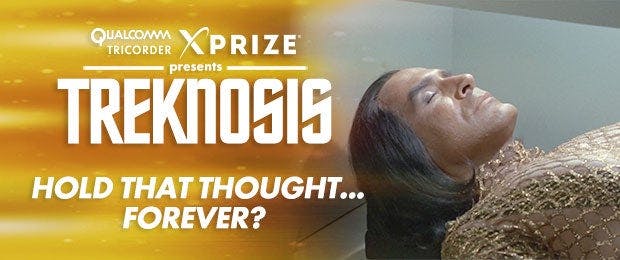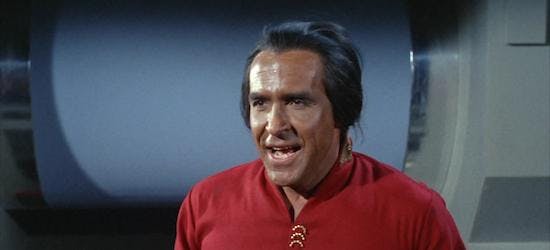Published Sep 21, 2015
XPRIZE Blog: Hold That Thought... Forever?
XPRIZE Blog: Hold That Thought... Forever?

Friends, if we're going to explore space, we need to talk for a moment about what we might have to do if we never achieve warp drive... or worse — if warp drive turns out to be possible, but actually using it is terrible idea (that sound you hear in the distance might be a Hekaran scientist yelling about the damage to the spacetime fabric induced by warp-speed travel). You and I know that the distances between the stars are almost unfathomably huge; even traveling at or near the speed of light, it'll take decades (if not centuries) to poke around our corner of the galaxy to see what's what — and that's without factoring in the unavoidable relativistic time-dilation effects.
So how are we going to manage those long journeys between the stars? If we send out ships, the people on them are going to need to breathe and eat, and that takes a lot of supplies. We basically have two options:
We can build ships with their own self-sustaining ecosystems and fill them with enough people to ensure a healthy breeding population, point those ships at the nearest promising-looking planets, and fire up the engines. Hopefully, once they arrive, there'll still be people on board — although they may be the descendants of the original crew 10 (or 100) generations removed. Essentially, we'd be preparing little capsules of human civilization and sending them into the void, hoping the inhabitants don't mutate enough to self-destruct along the way or present a threat to anyone else. That approach might present some problems. After all, life in a hollow world can get…complicated.

Or we could build ships, stuff them with people, slow down or stop all their bodily processes so they don't breathe, eat or age (a technique commonly known as "suspended animation" or "stasis"), and wake them up again when they get there. For that to work, we'd not only have to figure out the mechanics of suspended animation, we'd need to be very clear about who does — and does not — belong on these stasis ships in the first place.

Amazingly, it turns out we might be on our way to solving the first half of that problem relatively soon. Dr. Mark Roth of the Fred Hutchinson Cancer Research Center in Seattle has been doing some interesting work slowing down cell metabolism. When you get right down to it, your cells burn oxygen to make stuff happen. But what if you could reduce the amount of oxygen your cells need? They'd go about all their processes more slowly. You can accomplish this with the use of what Dr. Roth dubs "elemental reducing agents," or ERAs, which already exist in the body in very tiny concentrations.
The most useful application he sees goes something like this: you’ve been shot. Blood is leaking out of you. You're not getting enough oxygen to your brain, and you're going to flat-line in 60 seconds unless the damage can be repaired. But what if doctors could introduce the right amount of ERAs into your bloodstream to slow down the process of dying? Instead of 60 seconds, what about 60 minutes — or even 60 hours? Now what if your cells' death could be postponed indefinitely while a surgical team did all the repairs they needed and then restored your oxygen consumption to normal, effectively restarting your body? It sounds outlandish, but it might be how all surgeries are performed one day.

Assuming it takes off, could this technology be used for space travel? The answer to that question hinges primarily on whether a person in this kind of oxygen-inhibited suspended animation would age at all. Would you go into your stasis chamber on day one young and fit, only to emerge at the end of your journey a wrinkled geriatric? What is aging anyway at the subcellular level? Does it depend on the consumption of oxygen? We just don't know; we've never really been able to test that idea one way or another — and we may be years off yet.
Still, it looks promising. I'm looking forward to seeing where this goes in the future. And just to be on the safe side, maybe we should start building one of those stasis ships now, but let's all agree to not name it "Botany Bay," and maybe double-check the crew manifest.

